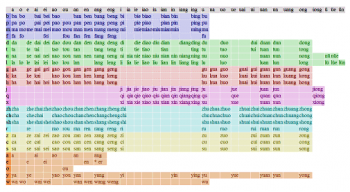Tag Archives: Pronunciation
Even More Tongue Twisters (绕口令) Posted by Stephen on Jun 29, 2012
Now that we’ve gone over some basic tongue twisters or 绕口令 (rào kǒu lìng) I thought this would be a good time to step up the level of difficulty and provide even more challenging tongue twisters. These ones will give you quite a workout, so if your tongue isn’t tired yet it should be after reading (and practicing)…
More Tongue Twisters Posted by Stephen on Jun 28, 2012
Now that we’ve covered some basic tongue twisters, it’s time to ramp up the level of difficulty. Try saying these tongue twisters five times fast. See if you can get as good as Jackie Chan: 青青山上一根籐 青籐地下掛銅鈴 風吹籐動銅鈴動 風停籐停銅鈴停 qīng qīng shān shàng yī gēn téng qīng téng dǐ xià guà tóng líng fēng chuī…
Tongue Twisters (绕口令) Posted by Stephen on Nov 22, 2011
On the first day of study abroad in Beijing, my Chinese teachers taught our class this little tongue twister to help us work with our tones: 老师是四十四,是不是?(lǎoshī shì sìshísì, shì bú shì) Translation: The Teacher is 44, no (is this true/true of false)? Why this seemingly innocuous sentence? Was it really all that important to…
Learning Chinese with Pinyin Posted by sasha on Jun 6, 2011
For anyone raised on the ABCs and 1-2-3s, learning Chinese can seem to be a daunting task. During my first few weeks in Beijing, I would often stare in disbelief at newspapers, menus, and street signs while thinking to myself, “How am I ever going to understand this language?” Luckily for me, and other equally…
Wingin’ It Posted by Stephen on Jul 20, 2010
Learning Mandarin Chinese, especially as a native English speaker, is doubly difficult because you’re learning both a new phonetic system (pinyin) and a new alphabet in the form of characters. It becomes a lesson in duality as both right and left brain are active when learning pictograms and their corresponding pronunciation and tones. But unlike…
Do You Have the Tone, Please? Posted by Transparent Language on May 11, 2008
One of the first challenges for the Western speaker of Chinese to overcome in learning to speak Mandarin Chinese is the introduction of tones to a language. In English, a rising or falling tone does little other than indicate emphasis: The whiny “What do you waaant?” as opposed to “What do you want!?” Not so…





